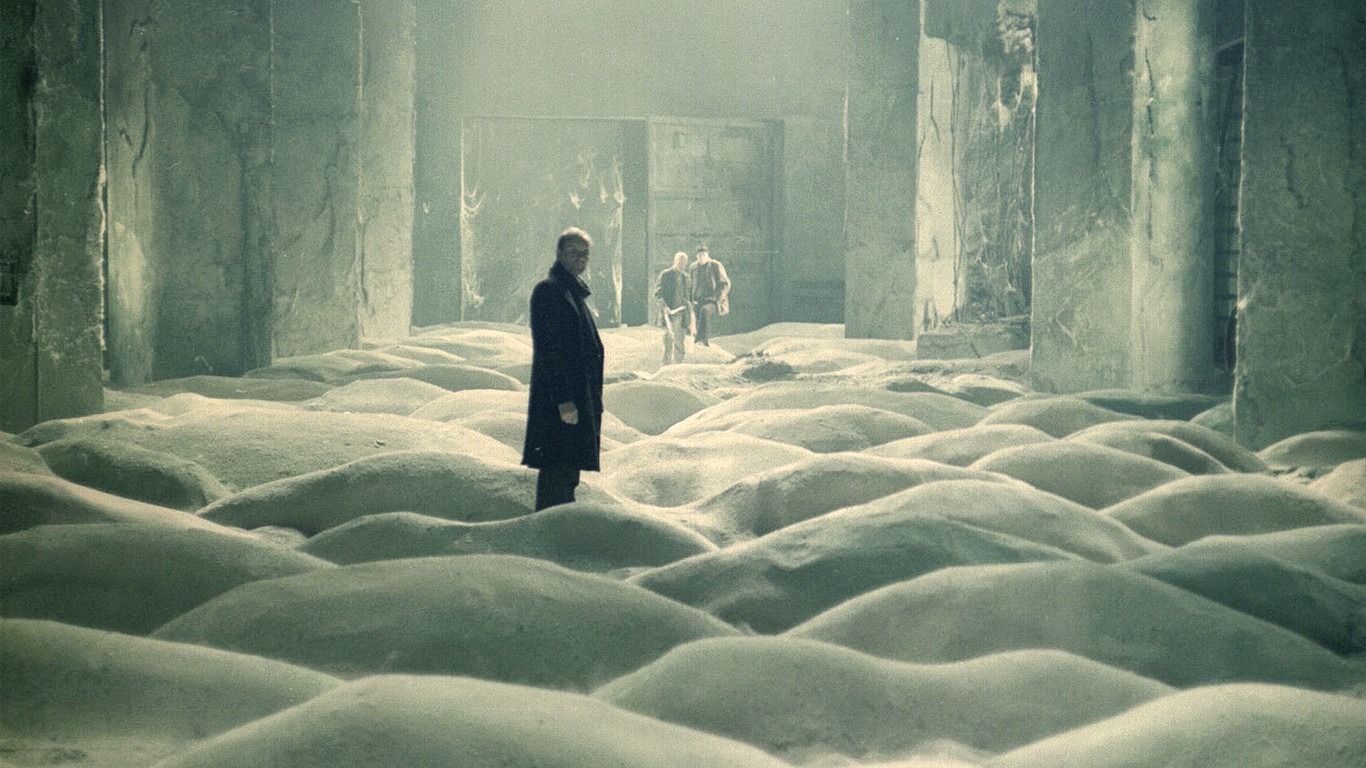
A post-apocalyptic world of Russia finds many seeking a means out of the depressing and washed-out world that appears in a muddy sepia. But there is another world, a more colorful landscape. This place is known as the Zone, a lavish and trippy paradise housing the spot known as the Room where all desires are met. The Zone is tough to get to from the military guarding it and even tougher to navigate through the Zone with its many traps that trick the mind.
Taking advantage of the Zone for his benefit is a man known only as the Stalker, his profession guiding others to the Room and selling items he discovers in the Zone. But the question remains why the Stalker would continue leading people to the Room if he himself could just enter the room and stay there. After all, his life in reality is deeply flawed, living in a household he doesn’t recognize and lacking in the faith to carry on. His Stalker profession is slowly revealed that it is more about of a need to feel faith in God through others. He feels his only purpose in life is to guide others and thrives off their faith to persist.
His two latest clients are a journalist and a scientist. Both of them are hoping to gain something from the Zone and the Room that they can report, mostly for fame. As they progress into the Zone, however, their talks begin to dig deeper into the nature of humanity and God. The traps of the Zone seem more mental with distraction and trickery, where a trek through a forest or a sewer system could lead to them being so distracted about the very essence of religion and humanity they don’t notice a phone here or a creature there. Sometimes they find themselves exhausted, lying down for a rest before the camera is distracted amid ramblings about what the point of living is when something like the Zone exists.
The reality of the world outside the Zone looks dour and dirty, rusty with old machinery and muddied with grime. The Zone itself appears more vivid even for carrying similar sensations of nature overtaking the world. One of the most striking sets features a large room with mounds of sand, another complicated trap for the trio to conquer in their minds.
Stalker deals with some heavy and sobering subject matter as well as featuring some amazing shots and locations. There’s a very loose sense of world perception that makes it easy to be swept away by the very ideas of what our actions and ambitions drive towards when death seems close. It’s a film that manages to be both subtle and blunt at the same time, deeply addressing concepts of God without abruptly arriving at any solid conclusion. The third act is the most chilling not so much for the cold realization but a rejection of the world not being so easy a place to explain away as the Zone or the Room being a definitive next step in where we belong.
Based on the novel Roadside Picnic by Boris and Arkady Strugatsky, the film was directed by the already accomplished director Andrei Tarkovsky (Solaris) and is by far his most crowning achievement as both a metaphysical sci-fi film and a deeply moving drama. Though long and slow moving, so much so that even a government group urged the film to be faster, the ease of the film helps to bring about a more meditative state in the film’s many uninterrupted and elongated takes. Tarkovsky ensures that we stay more in the idea and philosophy than within the moment. For

 “Deadpool & Wolverine” Review
“Deadpool & Wolverine” Review  “The Boys: Season Four” Review
“The Boys: Season Four” Review  “The American Society of Magical Negroes” Review
“The American Society of Magical Negroes” Review  “Twisters” Review
“Twisters” Review  “Sausage Party: Foodtopia” Review
“Sausage Party: Foodtopia” Review  “Robot Dreams” Review
“Robot Dreams” Review  “Godzilla x Kong: The New Empire” Review
“Godzilla x Kong: The New Empire” Review  “Slave Play. Not a Movie. A Play.” Review
“Slave Play. Not a Movie. A Play.” Review 


